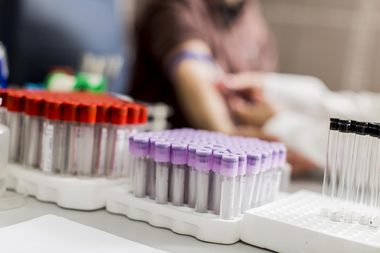Surprising prostate cancer facts
After skin cancer, prostate cancer is the most common cancer among men, according to the American Cancer Society. Here are some other facts you might not know.

Fewer men are being diagnosed than ever before
While it’s true that prostate cancer diagnoses are on the decline in the U.S., it’s not entirely for the reason that you think. That’s because this decline is mainly the result of a 2012 change in routine screening recommendations by the U.S. Preventative Task Force. The Task Force concluded that the risks of a PSA test, a blood test that can detect early prostate cancer, were higher than the benefits—that some patients diagnosed with the disease would never have died from it, but the diagnoses would result in surgeries or other therapies that could have side effects and result in other issues. While this change has been met with fewer diagnoses of low-grade and clinically significant prostate cancer, it’s been met with more frequent diagnoses of high-stage, high-grade prostate cancer. “Modern medicine in the U.S. has been successful in decreasing the number of prostate cancer diagnoses for men with insignificant cancer at the expense of missing more aggressive cancers at an earlier stage, meaning now there are more men with incurable prostate cancer than in the past,” explains S. Adam Ramin, MD, urologist and medical director of Urology Cancer Specialists in Los Angeles. (Here are the eight ways to lower your risk of prostate cancer.)

Age is the biggest risk factor
While it’s true that some races tend to harbor more aggressive forms of the disease, prostate cancer doesn’t discriminate—men of all races are at risk. Since it’s often a silent disease (as men generally don’t like talking about their health—and neither does the prostate), “Men with early-stage prostate cancer don’t experience symptoms,” says Ketan Badani, MD, vice chairman of urology, director of robotic surgery, Mount Sinai Health Systems. “In fact, the most common urinary symptoms older men experience are related to enlarged prostate and not cancer.” Without symptoms, prostate cancer can sneak up on you, which makes it more dangerous. These are the signs of prostate cancer you should never ignore.

The 5-year survival rate for prostate cancer is nearly 100 percent
Prior to PSA testing, a significant proportion of men diagnosed with prostate cancer already had an advanced, incurable form of the disease. “In 2017 only about 4 percent of newly diagnosed prostate cancers are expected to have spread to other organs, while this rate was 16 percent between 1983 to 1990,” says Yair Lotan, MD, chief of urologic oncology at University of Texas Southwestern Medical Center. “Since cancer is rarely curable when it spreads to other organs, the early diagnosis has improved outcomes for men with prostate cancer.” While there’s no such thing as a “good” cancer diagnosis, if found early, prostate cancer is highly curable and treatable. Plus, mostly all men diagnosed with it won’t die from it.

Robots can now be used to remove your prostate
Today, most prostate cancer treatments involve surgery using robotic assistance and proton beam radiation. But have no fear—the doctor still controls every movement on the robot. “This type of surgery is highly accurate and provides the surgeon the ability to visualize the field of operation,” explains Dr. Ramin. “Men who undergo robotic surgery for early-stage prostate cancer have an excellent chance of cure, while experiencing the least amount of side effects.” However, because robotic surgery is highly technical, it requires a high level of experience. Therefore, men with prostate cancer should seek surgeons with extensive training and experience. “The surgeon in turn should be willing to discuss his or her own personal success and complications rates with the patient,” Dr Ramin says. “When it comes to robotic surgery, the surgeon must not only discuss published results, but be honest and open to discuss his or her own results.”

Prostate cancer is one of the only cancers that can be detected through blood work alone
That being said, prostate cancer is not always detected on PSA tests, or blood tests that scan for it. “There are some prostate cancers that have normal PSA labs tests and are discovered only when doctors spot hard areas on the prostate during a digital rectal exam,” explains Jamin Brahmbhatt, MD, co-director of The PUR (Personalized Urology & Robotics) Clinic at South Lake Hospital in Clermont, Florida. Unfortunately, some men with “normal” PSAs may have prostate cancer. In fact, there is technically no specific normal or abnormal level since various factors cause these levels to fluctuate, according to the National Cancer Institute. “What this means for men is that if their PSA is rising consistently, even when in the ‘normal’ range, they should see a urologist,” suggests Dr. Lotan. “Also, men should know what their PSA levels are rather than just knowing if they’re normal or elevated.” Find out more about the 37 ways to cut your cancer risk, according to science.

Treatment does not have to cost a man his sex life or ability to have children
A lot of men will delay or fear treatment because of the risk it sometimes poses on erectile function. “Yes, as with any treatment, you may have difficulty achieving erections, but there are interventions we can recommend to keep you in the game,” explains Dr. Brahmbhatt. “These include medications like Viagra or Cialis, injection therapy, pumps, or even penile prosthetics.” In addition, men who have their prostate removed can technically still have children. “In the simplest terms, the purpose of the prostate is to create the fluid that allows sperm to make their way to the egg,” explains Dr. Badani. “Once a man’s prostate is removed, he continues to produce sperm, but not the fluid.” This means that it’s possible for a man to have children after his prostate has been removed—he just has to have the sperm harvested and then use artificial insemination. Good news: A lot of men have successfully had kids after prostate cancer.

A vasectomy does not increase your risk of prostate cancer
There was a viral story a few years ago that linked vasectomy with increased cancer risk, but, thankfully, that was fake news. “While this has been debated for a long time, having a vasectomy doesn’t appear to increase the risk of prostate cancer development,” says Daniel Landau, MD, oncologist with University of Florida Health Cancer Center at Orlando Health. “There was concern that the surgery itself could increase the incidence, but the latest publications say this isn’t the case.” In addition, there’s been some concern that testosterone replacement procedures may increase the risk of this cancer, since testosterone is a stimulant of prostate and prostate cancer growth. But several analyses of prostate tissue and men on testosterone replacement have not found an association between testosterone replacement and prostate cancer. Still, men on testosterone replacement should have routine monitoring of their PSA levels to detect cancer early, since testosterone may stimulate cancer growth if they already had cancer that was undetected. What does increase your risk of cancer is family history (first-degree relative) or being African American. Learn more about the eight prostate cancer myths all men should know.

Not every patient with prostate cancer needs treatment
There’s a growing realization that many men with prostate cancer will never die of their disease because unlike other types of cancer, prostate cancers can sometimes grow very slowly. Once a doctor performs a biopsy of the prostate, the cancer is evaluated to see if it’s the type that may not grow over time. “Some cancers are considered low risk and can be managed over time without definitive treatment,” explains Dr. Ramin. In fact, more and more patients with low-grade cancer may opt for what’s called “active surveillance,” where the doctors will just keep an eye out to make sure the cancer does not grow. “It’s important that men have a careful assessment of the severity and extent of their cancer prior to embarking on surveillance,” cautions Dr. Lotan. “Furthermore, the risks and benefits of surveillance need to be balanced by life expectancy and quality of life considerations.” In other words, even men who choose active surveillance need close monitoring with prostate exam and PSA, as well as periodic biopsies.

There are many treatments for men with metastatic prostate cancer
Unlike many cancers, where metastatic disease sometimes means a shorter life expectancy, there are many treatment avenues and promising agents on the horizon for prostate cancer. “Most patients with metastatic disease can live for years and, generally, there’s a good quality of life,” says Dr. Lotan. “Hormonal therapies play a major role initially, but other treatments including chemotherapy and targeted agents are also playing an important part in the armamentarium of urologists and oncologists.” Men with advanced disease should ask their doctor if there are clinical trials they can enroll in to try to access new treatments when they have exhausted standard treatments. (These are the 13 signs of cancer in men that many people ignore.)
